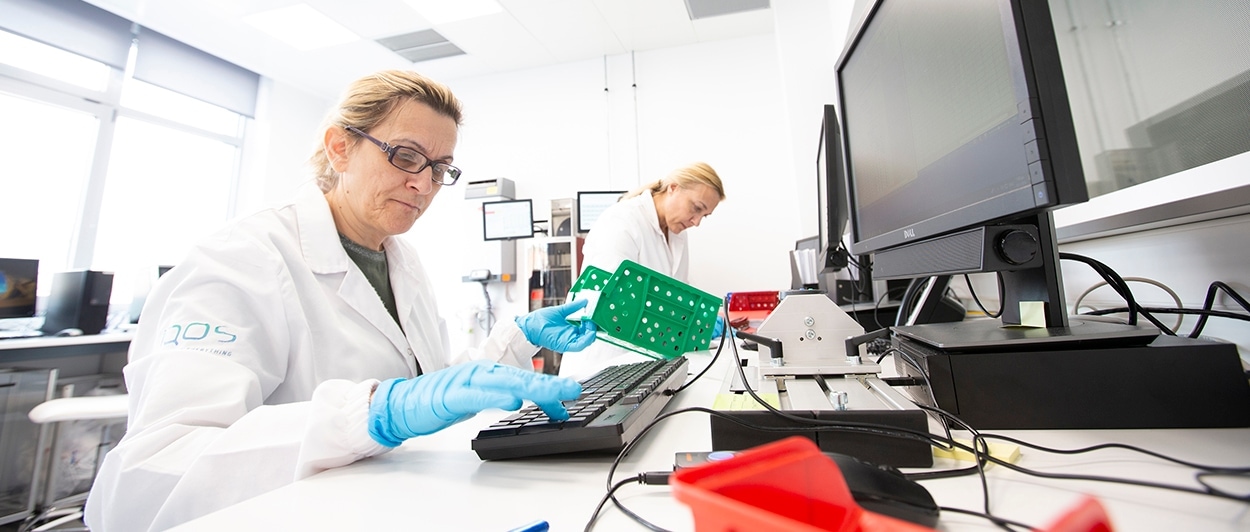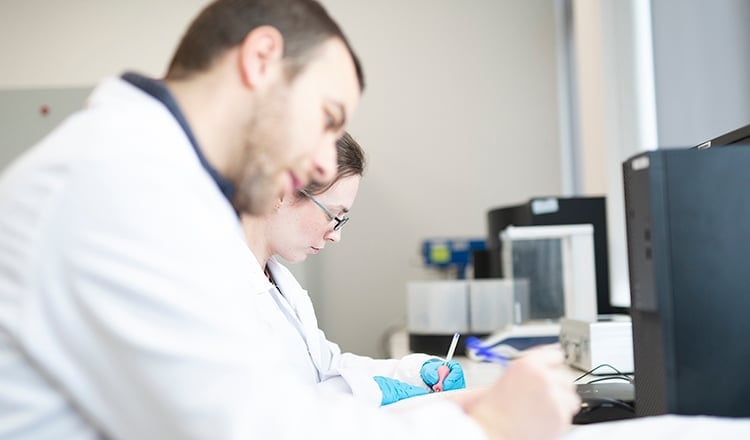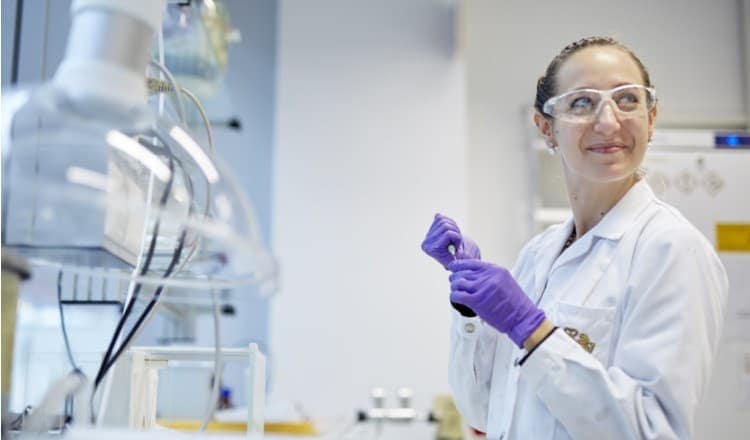| INTEGRATED REPORT 2019 |
Why it is important to us and our stakeholders
Scientific integrity, rigor, and transparency are necessary to drive positive societal change. Evidence resulting from robust scientific assessments advances the debate on public health and tobacco harm reduction, to the benefit of adult smokers.
At PMI, R&D is the catalyst for our business transformation. The way we conduct our research and development builds confidence in our scientific findings (with consumers, the scientific community, and regulators), protects our company from reputational risks, and ultimately allows us to commercialize our smoke-free products around the world. Excellence in executing R&D also helps preserve our social license to operate and safeguards our technology patents.
Achieving our aims
Our R&D work is focused on the substantiation of smoke-free alternatives, which, by eliminating combustion, reduces the levels of exposure to harmful and potentially harmful chemicals linked to smoking. In conducting R&D, we strive for excellence in line with international standards – with zero tolerance for compromise in either our scientific methods or their execution.
Decision-making on R&D strategy and direction is handled by specific committees at the product assessment level, project design level, and Board level. Among other responsibilities, the Board’s Product Innovation and Regulatory Affairs committee monitors the company’s internal scientific research, including the company’s efforts to substantiate the risk-reduction potential of its smoke-free products through rigorous scientific methodologies. Our Chief Life Sciences Officer holds the overall responsibility for our R&D strategy and plans, whereas the accountability for scientific excellence and transparency rests with our Chief Scientific Officer.
We regularly interact with an extensive network of stakeholders, including long-term study partners, research partners, production site personnel, universities, suppliers, consumers, and regulators. We adhere to high scientific standards, and our research is aligned with the U.S. Food and Drug Administration’s draft guidance on Modified Risk Tobacco Products (2012).
Our studies are conducted following available international standards, such as applicable ISO standards, OECD’s Good Laboratory Practices, and Good Epidemiological Practices. Importantly, all our clinical studies are conducted in accordance with the Declaration of Helsinki and the principles of Good Clinical Practices. These standards aim to ensure the quality and integrity of non-clinical and clinical studies.

Progress in 2019
Transparency of science
We recognize that scientific research from tobacco companies may be met with skepticism. Sharing our science and listening to feedback are fundamental to encouraging debate with experts and the broader public. We produce a regular briefing through our Scientific Update publication to complement what we share throughout the year through publications in peer-reviewed journals, presentations at conferences, and on PMIScience.
Since 2008, we have published over 365 papers on smoke-free products in peer-reviewed publications. In 2019, we presented our results at 64 scientific conferences. Our open-source data are freely available for verification via sbv IMPROVER, a collaborative project created to provide quality control of industry research. Since 2011, around 500 institutions have taken part in the initiative, which also includes conferences and an awards program. Previous sbv IMPROVER challenges have covered a range of topics, involved participants from 65 countries, and resulted in 16 peer-reviewed publications. Examples of previous challenges include microbiomics – identifying taxonomic profiles (2018); network verification – verifying lung biology network models (2018 and 2014); and Datathon Japan – assessing biological impact on omics data (2017).
Specifically, on toxicity data, the INTERVALS platform was designed to allow all relevant stakeholders to share and explore toxicity assessment data produced in relation to product alternatives to cigarettes. In 2019, 31 studies, 46 protocols, and 210 data sets were published (2018: nine, 57, 144, respectively).
The sharing of our scientific data and papers allows the research community and broader public to gain an in-depth perspective into how PMI conducts its R&D. Through our openness and transparency, we aim to educate, spark debate, and earn credibility and trust. We welcome objective studies by external stakeholders that seek to contribute to a science-based debate on the important societal question of tobacco harm reduction.
Animal testing
Animal studies allow us to confirm in vivo what toxicology studies show in vitro. For example, our findings indicate that the aerosol produced by our IQOS heat-not-burn product causes minimal effects compared with cigarette smoke. The results are consistent across the different ways diseases start, such as inflammation, cell stress, cell growth, and tissue repair. We use human-derived cells in vitro, but the animal studies in vivo allow us to scientifically assess the consistency of findings.
Despite toxicology standards accepting the use of rodents, we are working to replace animal testing with non-animal-based testing approaches to the extent possible – an effort that has been recognized by an animal welfare stakeholder group.1 We apply the 3R guidelines: replacement, reduction, and refinement. In 2019, PMI collaborated with, published papers from, or trained 37 organizations on non-animal methods for inhalation toxicity assessment (2018: 24). We hope that in time we will be able to replace much or all animal testing with alternative methods. Our animal welfare committee, composed of veterinary and scientific professionals with ample experience in animal testing, is responsible for reviewing protocols and examining them for compliance with scientific as well as animal welfare criteria.
This online supplement to our integrated report should be read in conjunction with PMI’s Integrated Report 2019. The information and data presented in this online supplement cover the 2019 calendar year or reflect status at December 31, 2019, worldwide, unless otherwise indicated. Where not specified, data come from PMI estimates. See About this online supplement for more information. Aspirational targets and goals do not constitute financial projections, and achievement of future results is subject to risks, uncertainties and inaccurate assumptions, as outlined in our forward-looking and cautionary statements.






